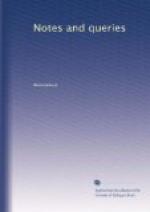T.E.L.L.
Hip, hip, Hurrah!—Originally a war cry, adopted by the stormers of a German town, wherein a great many Jews had taken their refuge. The place being sacked, they were all put to the sword, under the shouts of, Hierosolyma est perdita! From the first letter of those words (H.e.p.) an exclamation was contrived. We little think, when the red wine sparkles in the cup, and soul-stirring toasts are applauded by our Hip, hip, hurrah! that we record the fall of Jerusalem, and the cruelty of Christians against the chosen people of God.
JANUS DOUSA.
Under the Rose (Vol. i., p. 214.).—Near Zandpoort, a village in the vicinity of Haarlem, Prince William of Orange, the third of his name, had a favourite hunting-seat, called after him the Princenbosch, now more generally known under the designation of the Kruidberg. In the neighbourhood of these grounds there was a little summer-house, making part, if I recollect rightly, of an Amsterdam burgomaster’s country place, who resided there at the times I speak of. In this pavilion, it is said, and beneath a stucco rose, being one of the ornaments of the ceiling, William III. communicated the scheme of his intended invasion in England to the two burgomasters of Amsterdam there present. You know the result.
Can the expression of “being under the rose” date from this occasion, or was it merely owing to coincidence that such an ornament protected, as it were, the mysterious conversation to which England owes her liberty, and Protestant Christendom the maintenance of its rights?
JANUS DOUSA.
Huis te Manpadt.
Albanian Literature.—Bogdano, Pietro, Archivescovo di Scopia, L’Infallibile Verita della Cattolica Fede, in Venetia, per G. Albrizzi, MDXCI, is I think much older than any Albanian book mentioned by Hobhouse. The same additional characters are used which occur in the later publications of the Propaganda, in two parts, pp. 182. 162.
F.Q.
* * * * *
Queries.
BIBLIOGRAPHICAL QUERIES.
1. Has anything recently transpired which could lead bibliographers to form an absolute decision with regard to the “unknown” printer who used the singular letter R which is said to have originated with Finiguerra in 1452? That Mentelin was the individual seems scarcely credible; and there is a manifest difference between his type and that of the anonymous printer of the editio princeps of Rabanus Maurus, De Universo, the copy of which work (illuminated, ruled, and rubricated) now before me was once in Heber’s possession; and it exhibits the peculiar letter R, which resembles an ill-formed A, destitute of the cross stroke, and supporting a round O on its reclined back. (Panzer, i. 78.; Santander, i. 240.)




